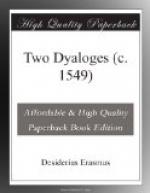and a lobbynge lobye as thou arte wolde be fed well
inoughe with haye and barke of trees. Poliphe.
Yea but chryste sayd, that which entereth in at
the mouthe defyleth not the man. Canni.
That is to be vnderstand thus yf it be measurably
taken, and without the offendinge of our christian
brother. But Paule the disciple of chryst had
rather peryshe & sterue with hunger then onys to
offende his weyke brothren with his eatynge, and
he exhorteth vs to followe his example that in all
thynges we maye please all men. Poli. What
tel ||ye me of Paule, Paule is Paule and I am I.
Cannius. Do you gladly helpe to releue the poore
and the indygent with your goodes? Poli.
Howe can I helpe them whiche haue nothynge to gyue
them, and scant inoughe for my selfe. Cannius.
ye myght spare somthynge to helpe the with yf thou
woldest playe the good husband in lyuynge more warely,
in moderatynge thy superfluous expenses, and in
fallynge to thy worke lustely. Poliphemus.
Nay then I were a fole in dede, a penyworth of ease
is euer worth a peny, and nowe I haue found so moch
pleasure in ease that I can not fall to no labour.
Canni. Do you kepe the commaundementes of god?
Polip. Nowe ye appose me, kepe the comaundementes
quod he, that is a payne in dede. Cannius.
Art thou sory for thy synnes and thyne offences,
doest thou ernestly repent the for the. Poliphemus.
Christ hath payed the raunsome of synne and satisfied
for it alredy. Cannius. Howe ||prouest thou
then that thou louest the gospell and fauoris the
word of god as thou bearest men in hande thou doest.
Poliphemus. I wyll tell you that by & by, and
I dare saye you wyl confesse no lesse your selfe
then that I am an ernest fauorer of the worde then
I haue told you ye tale. There was a certayne
gray frere of the order of saynt Fraunces with vs
whiche neuer ceased to bable and rayle agaynste
the newe testament of Erasmus, I chaunsed to talke
with the getylman pryuatly where no man was present
but he and I, and after I had communed awhyle with
hym I caught my frere by the polled pate with my
left hande and with my right hade I drew out my
daggar and I pomelled the knaue frere welfauardly
aboute his skonce that I made his face as swollen
and as puffed as a puddynge. Cannius. what
a tale is this that thou tellest me. Poliphemus.
How say you is not this a good and a sufficient
proue that I fa||uer the gospell. I gaue hym
absolucion afore he departed out of my handes with
this newe testament thryse layde vpon his pate as
harde as I myght dryue yt I made thre bunches in
his heed as bygge as thre egges in the name of the
father, the sone, & the holy goost. Can.
Now by my trouth this was well done & lyke a ryght
gospeller of these dayes. Truly this is as
they saye to dyffende the gospell with the gospell.
Poliphe. I met another graye frere of the same
curryshe couent, that knaue neuer had done in raylynge
agaynst Erasmus, so sone as I had espyed hym I was
styrred and moued with the brenninge zele of the




